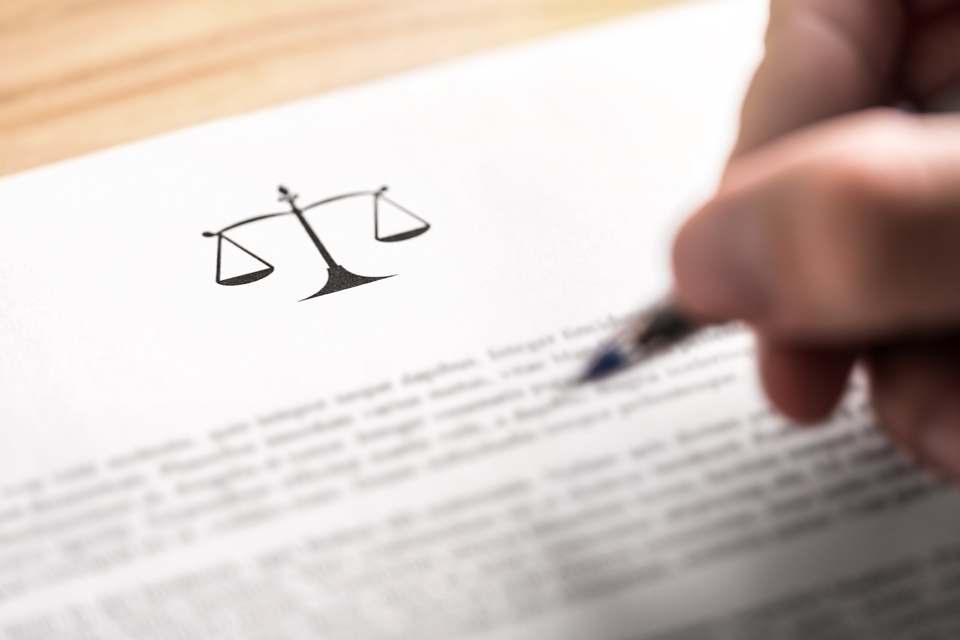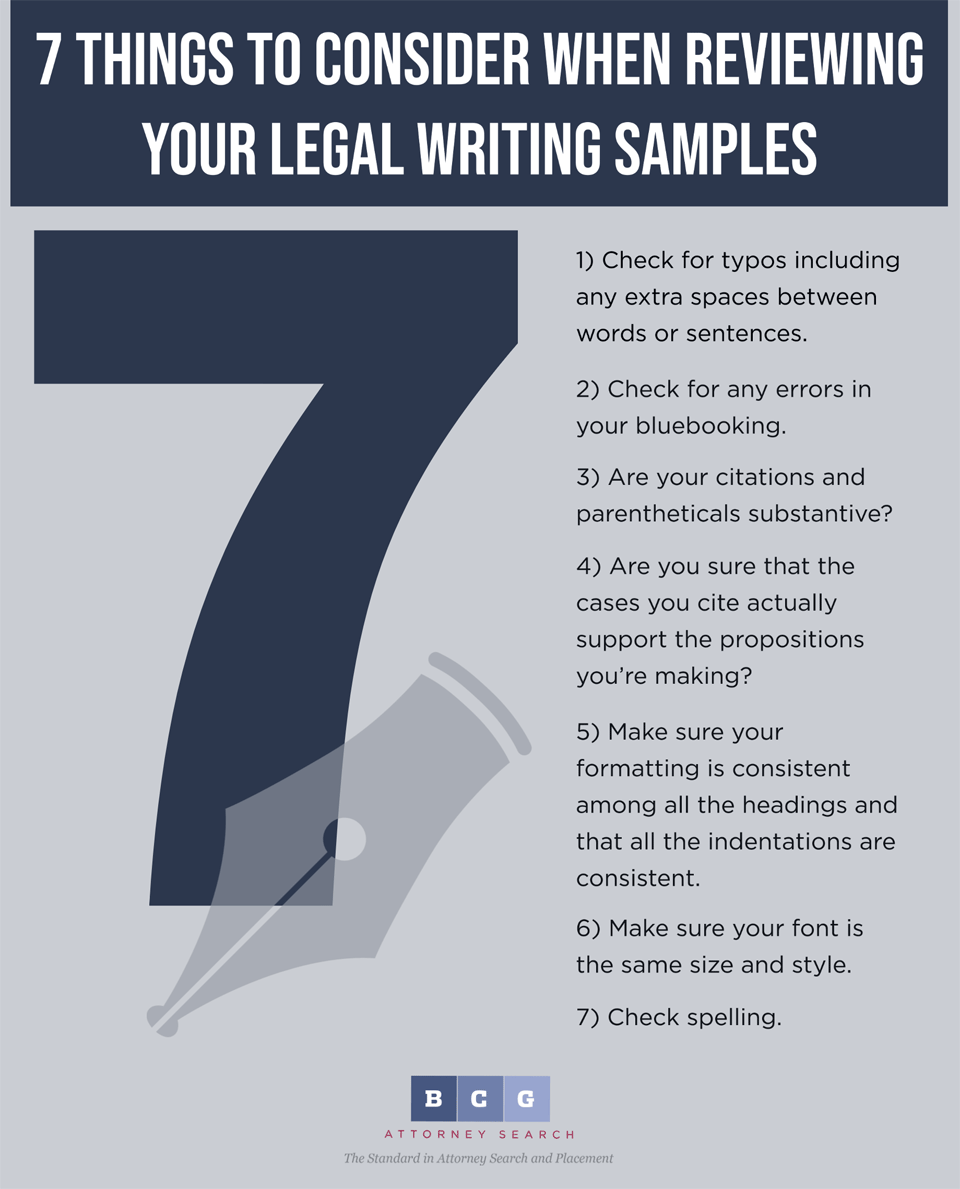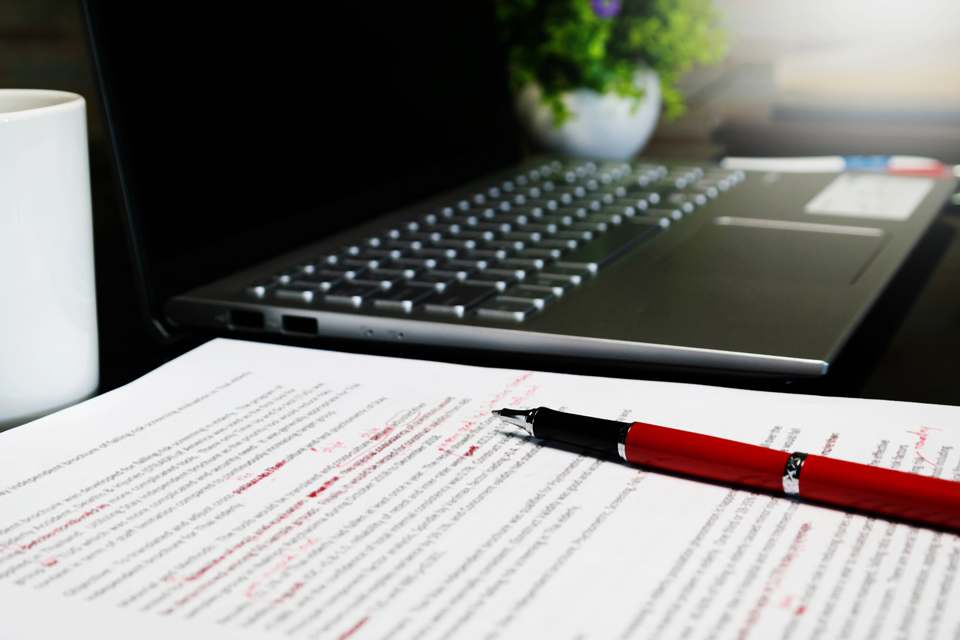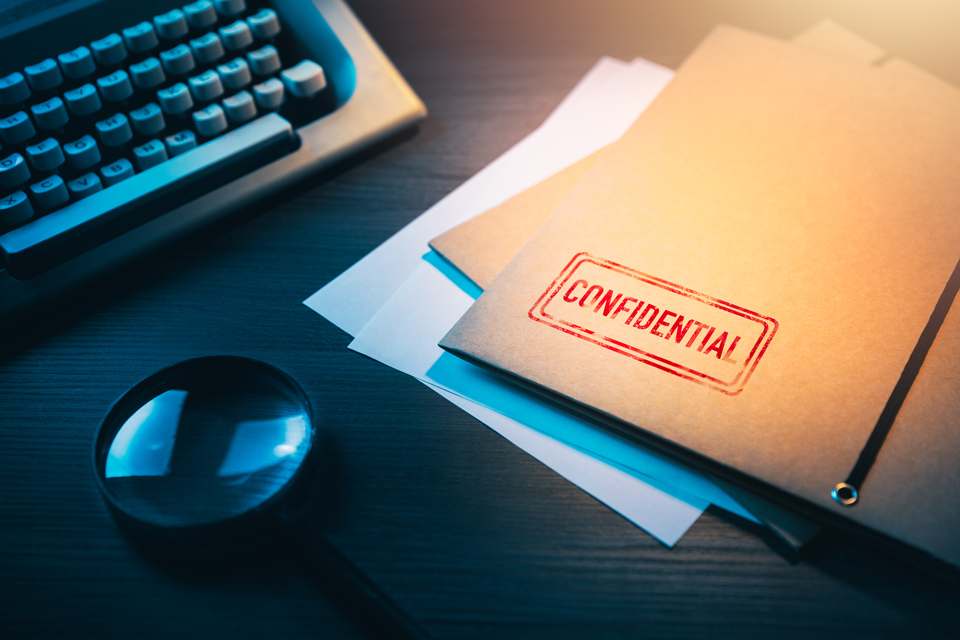Harrison Barnes' Legal Career Advice Podcast - Episode 97
What is typically given the least amount of attention by candidates but has the highest likelihood of undermining their chances of getting the job?

Writing Samples.
To show just how important a good writing sample can be, I will never forget the following email from a recruiting manager at a large firm.
" We’re going to pass on this candidate. It was a tough call. Although everyone loved [the candidate] and thought their personality and experience were by far the best of everyone we’ve interviewed so far, their writing sample had typos and fragmented sentences. This reflected negatively on [the candidate's] attention to detail and their ability to proofread--skills essential to our practice. Please continue th..e search for us!"
This illustrates how a legal writing sample has the potential to sabotage one's candidacy.
Interestingly, writing samples are seen by some attorneys in the job market as a mere after-the-fact formality that warrants only minimal attention.
- Many find it draining to search for the best lawyer writing sample, consider redactions/privilege issues, and review it with a fine-tooth comb for any mistakes, context, etc. There is a fear of finding errors and spending substantial time reworking the sample.
- Because most interviewers typically do not focus on writing samples (some will, even more so during law school), many job seekers are often under the false impression that writing samples are secondary compared to the contents of the résumé and how well they connect with their interviewer. Candidates do not see how writing samples are often scrutinized after the interviews.
- This fastidious quality should also accompany your Cover Letter and résumé that will go with your law firm application.

If you want to give yourself the best chance at getting a job, you must take the time to ensure that your legal writing sample is as close to perfect as it can be. This article provides some legal writing sample tips (based on frequently asked questions) to consider when selecting and preparing your writing sample. It demonstrates how you can ensure that it helps, rather than jeopardizes, your candidacy.
1. Proofread Your Writing Sample for Legal Job Multiple Times
How Many Times do I need to proofread my legal writing samples? When is it enough?

I cannot emphasize enough the importance of proofreading your samples several times. A good attorney writing sample is not enough; it must be completely proofed and error-free. Remember, most of what you have written was likely done under duress and against looming deadlines. If you are thinking of using a winning brief that you finished at 2:30 a.m. the morning before it was due, assume there will be a few typos and other errors, and your writing could benefit from a little proofing and polishing. Your writing sample should show your writing at its best.
Here are a few things to consider when reviewing your samples:
- Check for typos, including any extra spaces between words or sentences.
- Check for any errors in your Bluebook.
- Check if your citations and parentheticals were substantive.
- Check to make sure that the cases you cite support the propositions you are making. (I know law firms that have paralegals check the cases cited in the writing samples to ensure that the candidate has accurately cited them.)
- Make sure your formatting is consistent among all the headings and that all the indentations are consistent.
- Make sure your font is the same size and style.
- Check for spellings.
To ensure that you catch all of your errors and mistakes, print out your sample and review the hard copy. Proofreading is much more effective when examining the actual document on the hard copy instead of the computer screen. Another good legal writing tip is to read the document from the end to the beginning, sentence by sentence. By doing this, your brain will be forced to slow down and have a better chance of catching more errors.
When you think you have caught all your errors, review and proofread it one more time, when you catch those little typos you had not seen the previous two times, you will be glad you did.
Lastly, if you will email your sample, send it as a PDF. This way, you can avoid your word processing program picking up any grammatical errors or spelling irregularities (which may not be actual errors) and highlighting them with green or red squiggly lines.
2. Corporate/Transactional Attorneys
If I am a transactional or corporate attorney, do I still need a legal writing sample?
I am addressing corporate/transactional attorneys upfront because their situations are unique. Although most firms do not require a traditional writing sample for transactional attorneys (e.g., memoranda, persuasive writing samples), they want to see deal/transaction sheets. While deal/transaction sheets do not have the compelling writing component, they are still very important because, aside from showing your experience, they reflect your writing style, attention to detail, organization abilities, how you present key information, and whether the reader can easily understand the information you are presenting. Writing for law practice is an integral component of any attorney's work, so getting your writing right is essential.
(If you are interested in specific details regarding deal sheets, there are several very useful articles and samples on the BCG attorney search website to help you.)
3. Length of Writing Sample
How will the reader know what I am writing about in my example of legal writing? How much is enough?

Typically, the length of a writing sample for legal jobs ranges from 8 to 20 pages. This should be considered the legal writing sample format as it provides the firm with sufficient information for evaluation. Suppose you have a piece of writing that is very dense with an analytical and persuasive writing component (for example, a persuasive memo that is filled with arguments and analysis). In that case, you could get away with something shorter. However, if you use a brief you filed, anything less than eight pages typically does not present enough substance to evaluate. If the employer has a page limit, of course, always defer to that.
4. Using an Introduction/Overview to Provide Your Reader with Context
Should I include an introduction in my legal writing? How will the reader know what I am writing about if you take an excerpt from a longer brief?

Any writing sample for a law firm lateral or law school writing sample should come with a written introduction, especially if it requires context. This will ensure that the reader is not missing any important context. This introduction/overview can be on the cover page. It should provide a brief overview of the subject matter and the context, whether you have redacted/changed any confidential or privileged information, whether the writing sample is all your work, or whether it was a collaborative effort. (If there were edits to your work, see #8 below.)
5. Be Clear That You are Providing a Sample
How may I make sure that my writing sample is not confused with the actual final product?

As to an attorney writing sample format, it should be clear that what you are using is just a sample. A header or footer should be included on each page with a "[NAME] - WRITING SAMPLE." If you have redacted/changed information, put "[NAME] - REDACTED WRITING SAMPLE."
6. What is Confidential/Privileged?
Can I use a brief even if it was filed in court for a legal writing sample?

When in doubt whether something should be included in a writing sample for law firms, you should always check your local rules and relevant statutes about what is considered confidential/privileged. Also, seek a trusted second opinion, such as a local bar association's confidential ethics advisor. You will want to be extremely careful not to include any other confidential/privileged information as this could cause harm on several levels.
An often asked question is whether a brief or other material filed in public records can be used as a writing sample. If you have filed a document that is available in public records (and it was filed under seal) or, for example, the document was intentionally sent to the other party in litigation (without a protective order), this material is likely, not confidential/privileged because steps were not taken to keep it confidential and anyone could access the information. Because of this, it is likely something that could be used as a writing sample. But to be sure, check your local rules.
7. Redacting Confidential/Privileged Information
What do I do if my legal writing sample is confidential/privileged information?
There are several options. Some people change company names to generic names such as ACME or XYZ Corporation. However, depending on your preference, you could also cover up the confidential/privileged information with the highlighting tool on your word processing program. Rather than highlighting in the default yellow, you can change the highlighting color to black, which will cover up all the information.
Email Considerations. If you use the black highlighting function and email your sample, you should not send it out as a Word document because the highlighting can be easily removed. Also, even if you send it as a PDF, this can be circumvented: Somebody could copy the text from the PDF and paste it into a Word document and remove the highlighting. To be extra safe, the best thing to do is highlight the information in black, print it out, and then scan it in as a PDF. Then, you can email the PDF, and there is no way that the information under the black highlighting can be seen. (Of course, you can avoid these issues by making the information generic, such as ACME or XYZ Corporation, as discussed above.)
Can I redact documents, or can I redact information with Magic Markers? I recommend against using a black magic marker to redact information because it typically looks a bit sloppy. But if you have no choice other than to use a marker because the document is no longer in electronic form, you should use a brand new marker with straight edges as well as a ruler.
8. Joint Author/Collaboration Issues
I did not write the brief myself; can I still use it for my legal writing sample? I wrote most of the brief, but a partner made final changes.
While the ideal sample would be 100% your writing, this is rarely the case as most documents involve another person's edits/changes. If the work was not entirely your own, be sure to clarify this fact. You could specify this information in the introduction/overview (i.e., I wrote sections A and B, and the partner made some edits to section C), or you could specify the parts in the sample itself. For example, any variety of editing tools on your word processing program (e.g., strikethrough), you could indicate the parts of the sample that the other person/partner wrote.
Is this overkill? While it could seem that way, it shows unusually strong attention to detail, candid and frank honesty, awareness of ethical issues, and very sound overall judgment.
Published Articles: Several people ask about using published articles as writing samples. I typically do not recommend using published articles because there is an assumption that they have been heavily edited before going to publication and therefore do not accurately represent your writing. Plus, articles typically do not show heavy persuasive or analytical writing. That being said, if a published article is your best sample and was not edited, you should feel free to use it. Be sure to specify that there was no editing prior to publication. Or, if there was editing, if it is possible to send an earlier draft of the article that is only your writing.
I would recommend against sending an edited article explaining that it has been edited.
9. What the Sample Should Contain
Can my legal writing sample include the “facts” section of a brief?
The ideal writing samples show your analytical and persuasive writing abilities. While "facts" sections of briefs may show basic writing skills, they are rarely compelling and do not show how well you can apply the facts to the analysis/arguments. Furthermore, you will want to show your research skills and ability to use your research to the matter at hand; thus, the more citations you have (with detailed and thoughtful parentheticals), the better.10. Alternatives to the Traditional Brief or Memorandum
Can I use a persuasive letter written to opposing counsel for my legal writing sample?
If you have letters or other types of materials that highlight your persuasive and analytical writing skills, there is nothing wrong with using these. I have received feedback from firms saying they were very impressed with the "real world" writing samples.11. Your Writing Sample Should be as Recent as Possible
Can I use a paper I wrote while I was in law school? I am only a fourth-year associate.
Your writing sample should be as recent as possible because your writing skills constantly improve. Although an old writing sample may be convenient because it is already "done," using this is not putting your best foot forward and will shortchange your candidacy. Spending a bit more time to use something more recent is a worthy investment of time.
12. Once Again, Proofread.
Proof, proof, proof, and then proof again.
When I was preparing this article, I sent an email to all BCG recruiters, asking if they had any particular advice/thoughts on this subject. Everybody that responded had the same advice: Proofread!
Preparing writing samples is hard work. Reading briefs can be grueling. But the goal is to present the best representation of your skills to maximize your chances of getting the job you want. Follow these tips and make sure to make full use of every advantage at your disposal. It is a competitive job market and you will likely be up against multiple candidates. Just as you would do in the courtroom, leave nothing to chance that is in your control.
About Harrison Barnes
No legal recruiter in the United States has placed more attorneys at top law firms across every practice area than Harrison Barnes. His unmatched expertise, industry connections, and proven placement strategies have made him the most influential legal career advisor for attorneys seeking success in Big Law, elite boutiques, mid-sized firms, small firms, firms in the largest and smallest markets, and in over 350 separate practice areas.
A Reach Unlike Any Other Legal Recruiter
Most legal recruiters focus only on placing attorneys in large markets or specific practice areas, but Harrison places attorneys at all levels, in all practice areas, and in all locations-from the most prestigious firms in New York, Los Angeles, and Washington, D.C., to small and mid-sized firms in rural markets. Every week, he successfully places attorneys not only in high-demand practice areas like corporate and litigation but also in niche and less commonly recruited areas such as:
- Immigration Law
- Workers Compensation
- Insurance
- Family Law
- Trust and Estate
- Municipal law
- And many more...
This breadth of placements is unheard of in the legal recruiting industry and is a testament to his extraordinary ability to connect attorneys with the right firms, regardless of market size or practice area.
Proven Success at All Levels
With over 25 years of experience, Harrison has successfully placed attorneys at over 1,000 law firms, including:
- Top Am Law 100 firms such including Sullivan and Cromwell, and almost every AmLaw 100 and AmLaw 200 law firm.
- Elite boutique firms with specialized practices
- Mid-sized firms looking to expand their practice areas
- Growing firms in small and rural markets
He has also placed hundreds of law firm partners and has worked on firm and practice area mergers, helping law firms strategically grow their teams.
Unmatched Commitment to Attorney Success - The Story of BCG Attorney Search
Harrison Barnes is not just the most effective legal recruiter in the country, he is also the founder of BCG Attorney Search, a recruiting powerhouse that has helped thousands of attorneys transform their careers. His vision for BCG goes beyond just job placement; it is built on a mission to provide attorneys with opportunities they would never have access to otherwise. Unlike traditional recruiting firms, BCG Attorney Search operates as a career partner, not just a placement service. The firm's unparalleled resources, including a team of over 150 employees, enable it to offer customized job searches, direct outreach to firms, and market intelligence that no other legal recruiting service provides. Attorneys working with Harrison and BCG gain access to hidden opportunities, real-time insights on firm hiring trends, and guidance from a team that truly understands the legal market. You can read more about how BCG Attorney Search revolutionizes legal recruiting here: The Story of BCG Attorney Search and What We Do for You.
The Most Trusted Career Advisor for Attorneys
Harrison's legal career insights are the most widely followed in the profession.
- His articles on BCG Search alone are read by over 150,000 attorneys per month, making his guidance the most sought-after in the legal field. Read his latest insights here.
- He has conducted hundreds of hours of career development webinars, available here: Harrison Barnes Webinar Replays.
- His placement success is unmatched-see examples here: Harrison Barnes' Attorney Placements.
- He has created numerous comprehensive career development courses, including BigLaw Breakthrough, designed to help attorneys land positions at elite law firms.
Submit Your Resume to Work with Harrison Barnes
If you are serious about advancing your legal career and want access to the most sought-after law firm opportunities, Harrison Barnes is the most powerful recruiter to have on your side.
Submit your resume today to start working with him: Submit Resume Here
With an unmatched track record of success, a vast team of over 150 dedicated employees, and a reach into every market and practice area, Harrison Barnes is the recruiter who makes career transformations happen and has the talent and resources behind him to make this happen.
A Relentless Commitment to Attorney Success
Unlike most recruiters who work with only a narrow subset of attorneys, Harrison Barnes works with lawyers at all stages of their careers, from junior associates to senior partners, in every practice area imaginable. His placements are not limited to only those with "elite" credentials-he has helped thousands of attorneys, including those who thought it was impossible to move firms, find their next great opportunity.
Harrison's work is backed by a team of over 150 professionals who work around the clock to uncover hidden job opportunities at law firms across the country. His team:
- Finds and creates job openings that aren't publicly listed, giving attorneys access to exclusive opportunities.
- Works closely with candidates to ensure their resumes and applications stand out.
- Provides ongoing guidance and career coaching to help attorneys navigate interviews, negotiations, and transitions successfully.
This level of dedicated support is unmatched in the legal recruiting industry.
A Legal Recruiter Who Changes Lives
Harrison believes that every attorney-no matter their background, law school, or previous experience-has the potential to find success in the right law firm environment. Many attorneys come to him feeling stuck in their careers, underpaid, or unsure of their next steps. Through his unique ability to identify the right opportunities, he helps attorneys transform their careers in ways they never thought possible.
He has worked with:
- Attorneys making below-market salaries who went on to double or triple their earnings at new firms.
- Senior attorneys who believed they were "too experienced" to make a move and found better roles with firms eager for their expertise.
- Attorneys in small or remote markets who assumed they had no options-only to be placed at strong firms they never knew existed.
- Partners looking for a better platform or more autonomy who successfully transitioned to firms where they could grow their practice.
For attorneys who think their options are limited, Harrison Barnes has proven time and time again that opportunities exist-often in places they never expected.
Submit Your Resume Today - Start Your Career Transformation
If you want to explore new career opportunities, Harrison Barnes and BCG Attorney Search are your best resources. Whether you are looking for a BigLaw position, a boutique firm, or a move to a better work environment, Harrison's expertise will help you take control of your future.
Submit Your Resume Here to get started with Harrison Barnes today.
Harrison's reach, experience, and proven results make him the best legal recruiter in the industry. Don't settle for an average recruiter-work with the one who has changed the careers of thousands of attorneys and can do the same for you.
BCG Attorney Search matches attorneys and law firms with unparalleled expertise and drive, while achieving results. Known globally for its success in locating and placing attorneys in law firms of all sizes, BCG Attorney Search has placed thousands of attorneys in law firms in thousands of different law firms around the country. Unlike other legal placement firms, BCG Attorney Search brings massive resources of over 150 employees to its placement efforts locating positions and opportunities its competitors simply cannot. Every legal recruiter at BCG Attorney Search is a former successful attorney who attended a top law school, worked in top law firms and brought massive drive and commitment to their work. BCG Attorney Search legal recruiters take your legal career seriously and understand attorneys. For more information, please visit www.BCGSearch.com.
Harrison Barnes does a weekly free webinar with live Q&A for attorneys and law students each Wednesday at 10:00 am PST. You can attend anonymously and ask questions about your career, this article, or any other legal career-related topics. You can sign up for the weekly webinar here: Register on Zoom
Harrison also does a weekly free webinar with live Q&A for law firms, companies, and others who hire attorneys each Wednesday at 10:00 am PST. You can sign up for the weekly webinar here: Register on Zoom
You can browse a list of past webinars here: Webinar Replays
You can also listen to Harrison Barnes Podcasts here: Attorney Career Advice Podcasts
You can also read Harrison Barnes' articles and books here: Harrison's Perspectives
Harrison Barnes is the legal profession's mentor and may be the only person in your legal career who will tell you why you are not reaching your full potential and what you really need to do to grow as an attorney--regardless of how much it hurts. If you prefer truth to stagnation, growth to comfort, and actionable ideas instead of fluffy concepts, you and Harrison will get along just fine. If, however, you want to stay where you are, talk about your past successes, and feel comfortable, Harrison is not for you.
Truly great mentors are like parents, doctors, therapists, spiritual figures, and others because in order to help you they need to expose you to pain and expose your weaknesses. But suppose you act on the advice and pain created by a mentor. In that case, you will become better: a better attorney, better employees, a better boss, know where you are going, and appreciate where you have been--you will hopefully also become a happier and better person. As you learn from Harrison, he hopes he will become your mentor.
To read more career and life advice articles visit Harrison's personal blog.














